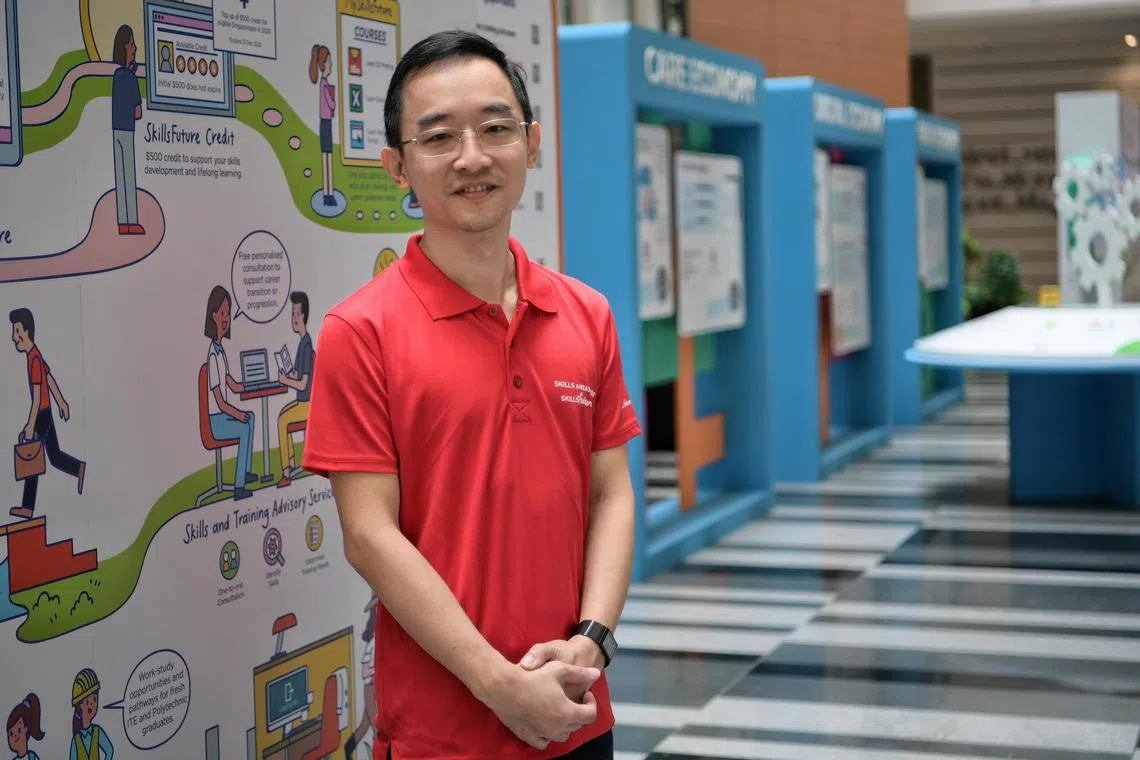Important for mid-career workers in 5 job types to upskill to stay versatile: SkillsFuture report
Sign up now: Get ST's newsletters delivered to your inbox

Mr Kendray Lau manages a team advising Singaporeans of all ages seeking help in charting their careers or making a career switch.
ST PHOTO: NG SOR LUAN
SINGAPORE – Mid-career workers who are between 40 and 59 years old make up about half the country’s workforce, and they mostly hold the five kinds of jobs that are experiencing disruption.
These five “job families” are operations and administration; sales, marketing and customer service; human resource; finance and accounting; and engineering and technology, the latest SkillsFuture Singapore report
The Skills Demand For The Future Economy report, which was released last Tuesday, said these job families face transformation and redesign. So it is important for workers to think about upskilling or reskilling to stay versatile or take on new opportunities, it added.
Upskilling refers to learning additional skills to move into other roles within the same family of jobs, while reskilling is learning new skills to move into a role in a different job family.
The report said: “With increasing technology adoption, changing business and operating models, and rising focus on sustainable practices, the work content and skills needed by these roles are increasingly changing.”
Ms Adeline Sim, co-owner and executive director of recruitment firm HRnetGroup, said mid-career workers are particularly vulnerable to economic changes, as they are typically more expensive in terms of salary and more resistant to new technology than fresh graduates.
She added: “Generally, these workers are significantly more costly to an organisation than someone who is fresh out of school. So the question becomes: Are you able to perform the same role or better than fresh grads?
“Fresh grads can be just as effective, but much cheaper than those who are more senior.”
This is also because fresh graduates are more open or exposed to technological developments, including video-conferencing apps such as Zoom, to manage hybrid or flexible work, Ms Sim added.
The report also details several ways for mid-career workers to upgrade their skills to move into roles that are becoming more popular.
For example, mid-career workers in sales, marketing and customer service already have skills that can be applied in similar but more popular roles.
But for many, transitions are not just about skills but emotions too, said Mr Kendray Lau, a skills ambassador lead at SkillsFuture Singapore.
Mr Lau manages a team advising Singaporeans of all ages seeking help in charting their careers or making a career switch.
He told The Straits Times: “There’s a lot of uncertainty and a lack of clarity on what people really want, which results in their feeling confused or paralysed.”
He said many who feel stuck in their jobs are those working in fields they are not interested in, having joined because they wanted job stability, a relatively common practice in the past.
Mr Lau and his team of skills advisers are working to give such workers more personalised consultation and guidance on getting skills that will serve them in the long term, he said.
SkillsFuture Singapore, in response to queries, said that 32 per cent of mid-career Singaporeans used their SkillsFuture credits in 2021.
Ms Sim said the ability to pick up new skills has become much more critical, and putting oneself in training may send a signal to employers that one is ready and willing to learn.
Mr Firdaus Adris, 40, sees the opportunity to upskill as a privilege that he did not have when he started work.
After completing his national service in 2000, Mr Firdaus discovered an interest in aviation.
He joined an aerospace company, and the next three years saw him looking for opportunities in the aviation sector. However, he found that there were limited training courses outside his company and he had to rely solely on in-house training.
He found himself stuck in the same position in his initial years, and watched many of his peers move on to senior roles.
Now, as global operations manager at technical services company Aero Inspection Asia, Mr Firdaus ensures that all fresh graduates can get opportunities to upgrade their skills.
He said: “I am in a position now where I understand how difficult career growth can be, especially for these young engineers.
“I feel like it is my responsibility to emphasise the importance of upskilling and how everyone can really take advantage of these opportunities to upskill and go further in their careers.”
Mr Firdaus is among 23 Singaporeans who were each given a $10,000 reward for their skills mastery and skills development at the SkillsFuture Fellowships and SkillsFuture Employer Awards ceremony last Tuesday.
Since 2016, 143 individuals have been recognised for skills mastery in their respective fields, as well as for their commitment to mentoring others in the spirit of lifelong learning.


